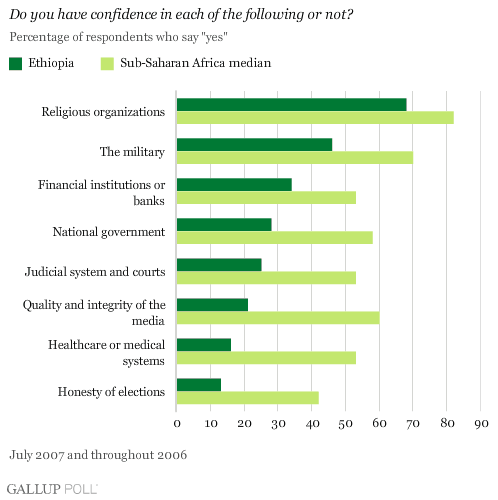WASHINGTON, D.C. -- In the Horn of Africa, democracy is rather scarce. But in 2005, Ethiopian voters went to the polls in the country's first multiparty parliamentary elections to pave the way for establishing democratic values. The opposition and the ruling party, however, claimed victory, thrusting the nation into political crisis and violence. After opposition leaders were convicted and sentenced to life in prison for "outrage against the constitution and incitement of armed rebellion" (although the government pardoned them last summer), Ethiopians' hope for a peaceful political transition was shattered. In 2006, Human Rights Watch reported that the government used "excessive force" to repress any political dissent over the election outcome and jailed Ethiopians arbitrarily. Further, before Gallup started polling in the country, the government launched a military operation in the Ogaden, Ethiopia's Somali region, to eliminate a separatist movement called the Ogaden National Liberation Front (ONLF). In the process, many Ethiopian civilians were killed. It is against this challenging backdrop that Gallup gauged Ethiopians' confidence in their country's institutions.
The poll conducted in July 2007 reveals that relatively few Ethiopians express confidence in their country's social and political institutions. Religious organizations are the only national entities to garner trust from a majority of respondents (68%). The military rank a distant second, as 46% of Ethiopians express confidence in the armed forces. Further, fewer than 4 in 10 Ethiopians express confidence in the other national institutions tested in the poll. The national government garners trust from just 28% of Ethiopians, and the judiciary fares as poorly, eliciting confidence from about one-quarter of respondents. But participatory politics prompt the lowest levels of trust, as only 13% of Ethiopians have confidence in the honesty of elections.
Across the sub-Saharan African region, respondents typically are most likely to express the greatest confidence in religious organizations followed by the military. Although the same pattern prevails in Ethiopia, respondents are less likely than most of their regional neighbors to express confidence in their national institutions. Ethiopians' level of trust in their national government, judiciary, and the honesty of elections is lower than the regional medians for sub-Saharan Africa by roughly 30 percentage points. Ethiopians' trust in religious organizations lags behind the regional median (82%) by 14 points. Furthermore, two social institutions prompt the greatest gaps in trust: Twenty-one percent of Ethiopians say they have confidence in the quality and integrity of their media, compared with a sub-Saharan median of 60%, and just 16% of Ethiopians have confidence in their country's healthcare system versus a regional median of 53%.

In light of the allegations of fraud that followed the 2005 national elections and the civil unrest that ensued, Ethiopians' relatively low level of trust in the honesty of elections is, perhaps, to be expected. But it is the consistent gap in confidence between Ethiopians and other sub-Saharan Africans across all eight institutions that gives pause. According to Terrence Lyons, professor of conflict resolution at George Mason University, the poll findings suggest that stability in the country is fragile. Says Lyons, "the population has acquiesced to the ruling party, but it doesn't mean that [Ethiopians] agree with the government policies."
Survey Methods
Results are based on face-to-face interviews with 1,000 adults, aged 15 and older, in Ethiopia conducted in July 2007. Poll data from Burkina Faso, Cameroon, Ghana, Kenya, Malawi, Mozambique, Nigeria, Senegal, South Africa, Tanzania, Zambia, and Zimbabwe were collected in 2007. For Angola, Benin, Botswana, Burundi, Chad, Mali, Madagascar, Mauritania, Niger, Rwanda, Sierra Leone, Uganda, and Togo, the data were collected throughout 2006.
For results based on the total sample of national adults, one can say with 95% confidence that the maximum margin of sampling error is ±5 percentage points. In addition to sampling error, question wording and practical difficulties in conducting surveys can introduce error or bias into the findings of public opinion polls.
